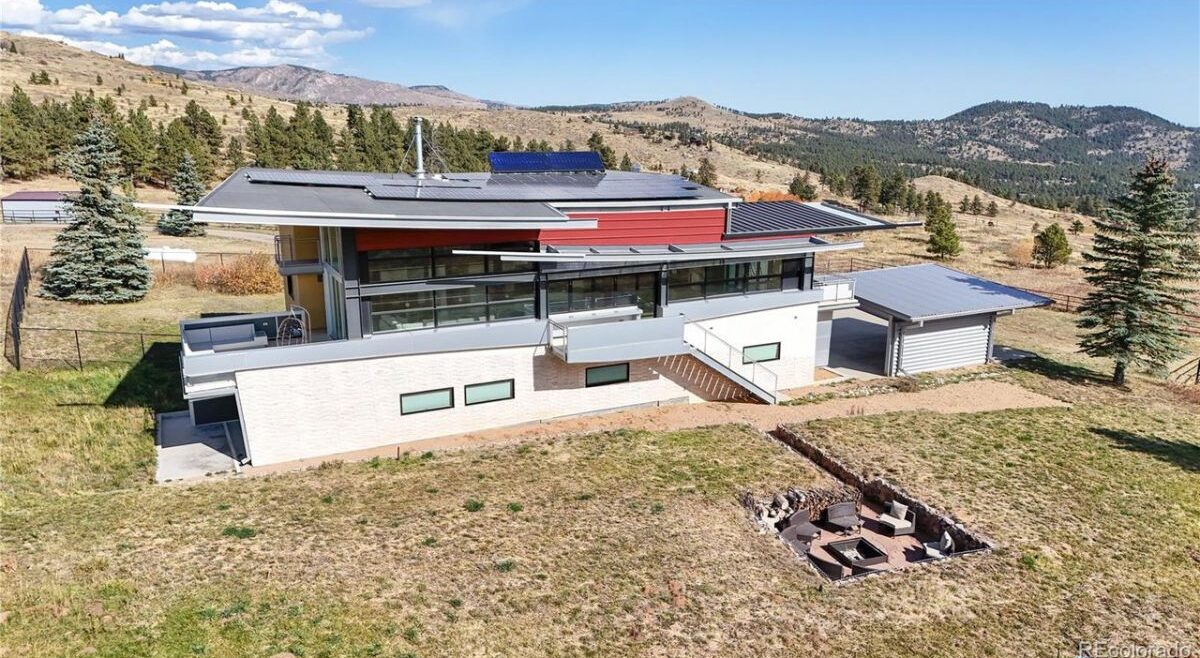The Crystal Ball of Real Estate
by Osman Parvez

Many recent clients are asking whether to buy/sell now or to hold off on their real estate decisions. They’re reading the national news about dropping prices and increasing inventory and rightly wonder whether local prices will be up, down, or flat next year.
What do I think?
I think it’s easy to forecast a flat or down real estate market nationwide in ’07 because of the collapsing bubbles in coastal metro areas and in certain markets like Phoenix and Las Vegas. But it’s much harder to predict what will happen in non bubble markets. Here in Boulder, we’re not seeing a market collapse. There is no 10x increase in inventory. We’re not seeing 20% price plunges. But we are seeing varying degrees of impact, as expected. See my latest monthly updates for details.
Sadly, there is no crystal ball in real estate. But you can identify a cauldron of market forces which tend to mix together and will eventually have a net impact. It’s not a crystal ball, but understanding these drivers can help you make a better real estate decision.
Below you’ll find a short list of economic forces to think about. The list below is not meant to be inclusive. In fact, I think it’s only a start. So feel free to leave comments with additional economic forces that should be included and I’ll revise the list going forward.
Before we begin, remember that the local specifics of the property you buy or sell will have much more to do with it’s long term performance (relative to the local market) over time. In other words, choose a home in a bad location and you will suffer. Choose the proverbial “worst house in best neighborhood” and you will probably do better.
You also need to do the math relative to your holding period. I’ve played out scenarios with buy vs. rent models extensively and have found that even in flat markets, buying and holding eventually beats out renting. In most cases, I usually recommend a minimum of 5 year holding period. If you plan to own the home for only a year or two, without a compelling tax shelter strategy of some sort, you’ll probably find that renting makes more financial sense than buying. You should also consider that renting and buying both have an opportunity cost. Plus, the longer you hold, the better it looks. Again, please do the math before you make a decision.
I recently started having what I call “work sessions” with clients. It time I set aside to help clients do the math, learn about the market, and think through options. If you need help, want to set up a work session, or would simply like a complimentary copy of my buy vs. rent model, contact me.
Potential Macro Economic Forces
1. Economic recession in 2007. We saw two yield curve inversions in 2006, classic predictors of recession. Mortgage equity withdrawals are expected to slow, credit is expected to tighten, and consumer spending (though currently robust) may take a dive. The surge in spending on Black Friday was accompanied by news of a drop in orders for durable goods. Plus, real estate is a core driver of the economy and the industry as a whole may be shifting dramatically. The latest estimate of 3Q growth was just revised upwards to 2.2%, and is being heralded as a “soft landing” but there is still a reasonable chance of recession next year.
2. Interest Rates. Many economists predict flat or possibly lower interest rates in 2007. Bernake is “optimistic” for a soft landing, but cites the possibility of labor shortage as an inflationary force. In other words, there are mixed economic signals out there and it could clearly go either way. This article sums it up nicely.
3. Exchange Rates (FX). If the dollar continues to slide downward, your purchasing power for foreign products errodes. The majority of the stuff people buy in Home Depot, Wal-Mart, and elsewhere is not made in the United States. Here’s an article on where the dollar might be heading.
4. The Boomers. This is a big one. A recent study showed that 80% of baby boomers expect to move at least once more. Del Webb/Pulte homes surveyed the boomers in 2003 and found 59% plan to move for retirement, up from 31% in 1999. How many Boomers are we talking about?
Let’s do a little back of the envelope math. There are about 75 million baby boomers. If you believe the studies, 23 to 60 million people who will move over the next 18 years. If half those people sell a home and buy elsewhere, that’s an average of 1.3 to 3.3. million transactions a year over the next 18 years.
How many homes sold last year? Just under 8 million. In 2000, there was roughly 6 million home sales. If you’re a bubblehead and believe home sales volume will fall back to 2000 levels, the average number of boomer transactions per year will add between 21 and 55% volume for the next 18 years. If you believe home sales volume will stay the same as 2005, the impact will be 16 to 42%.
In our economic myopia, I don’t hear a lot of talk about the Boomers but you can see why we should be. Even using the conservative estimates, the impact will be massive. It’s even more important for luxury/2nd home real estate markets like Aspen, Vail, Nantucket, Jackson Hole, and others.
Potential Micro/Local Economic Forces
1. Immigration. Colorado has net positive immigration. Between 1990 and 2000, more than a million people moved or were born here and our state population increased by 30% (ref). That’s the third largest population increase in the country during the period. As a magnet for cultural creatives, we’re also benefiting from a clustering of talent and capital. Why are they moving here? They’re coming to escape stratospheric real estate prices on the coasts. They’re coming for quality of life, including 300 days of sunshine a year and stunning outdoor recreation. They’re coming simply because it’s a fantastic place to live, work, and play. Remember the 80% of Boomers who plan to move? Colorado will receive many of them in places like Ft. Collins, voted #1 place to retire by CNN/Money Magazine. Families moving here might choose Louisville, voted #1 affordable place to raise a family.
2. Economic Diversification and entrepreneurship. The Denver/Boulder region has a more diversified economy than ever before. Should it occur, industry specific job losses in businesses such as telecom or biotechnology will have less impact than in the past. Our region is also a hot bed of entrepreneurship. It seems as if every person I know is connected or at most one step removed from a startup company.
3. Builder Cancellations. I’ve heard some large builders towards the east of the front range are slowing their expected build out and in some cases, are canceling projects. This will tighten home supply in places like Erie. Hopefully it will help begin to shore up the horrible market conditions in places like Weld County.
4. Redevelopment. If you’ve been reading this blog, you know that redevelopment projects throughout the region are accelerating. Massive public transit projects are coming on-line or advancing through the planning stages, encouraging transit oriented development. Certain areas will be amenitized by new urbanism style, mixed use development projects.
—
So there’s a handful of market forces to consider when you’re thinking about your real estate decisions. As a conservative, I encourage long term ownership oriented thinking. Long holding periods are investments in community. Those that can stomach the ups and downs of a market cycle tend to do very well in the long term.
I hope you’ve found this post interesting. Feel free to leave a comment, if you’d like. You can also reach me at 303.746.6896.
Image: ghostboy
—-
Want to get blog updates via email? Click HERE.
Ready to buy or sell? Schedule an appointment or call 303.746.6896.
You can also like our Facebook page or follow us on Twitter.
As always, your referrals are deeply appreciated.
—
The ideas and strategies described in this blog are the opinion of the writer and subject to business, economic, and competitive uncertainties. We strongly recommend conducting rigorous due diligence and obtaining professional advice before buying or selling real estate.
The Crystal Ball of Real Estate
by Osman Parvez

Many recent clients are asking whether to buy/sell now or to hold off on their real estate decisions. They’re reading the national news about dropping prices and increasing inventory and rightly wonder whether local prices will be up, down, or flat next year.
What do I think?
I think it’s easy to forecast a flat or down real estate market nationwide in ’07 because of the collapsing bubbles in coastal metro areas and in certain markets like Phoenix and Las Vegas. But it’s much harder to predict what will happen in non bubble markets. Here in Boulder, we’re not seeing a market collapse. There is no 10x increase in inventory. We’re not seeing 20% price plunges. But we are seeing varying degrees of impact, as expected. See my latest monthly updates for details.
Sadly, there is no crystal ball in real estate. But you can identify a cauldron of market forces which tend to mix together and will eventually have a net impact. It’s not a crystal ball, but understanding these drivers can help you make a better real estate decision.
Below you’ll find a short list of economic forces to think about. The list below is not meant to be inclusive. In fact, I think it’s only a start. So feel free to leave comments with additional economic forces that should be included and I’ll revise the list going forward.
Before we begin, remember that the local specifics of the property you buy or sell will have much more to do with it’s long term performance (relative to the local market) over time. In other words, choose a home in a bad location and you will suffer. Choose the proverbial “worst house in best neighborhood” and you will probably do better.
You also need to do the math relative to your holding period. I’ve played out scenarios with buy vs. rent models extensively and have found that even in flat markets, buying and holding eventually beats out renting. In most cases, I usually recommend a minimum of 5 year holding period. If you plan to own the home for only a year or two, without a compelling tax shelter strategy of some sort, you’ll probably find that renting makes more financial sense than buying. You should also consider that renting and buying both have an opportunity cost. Plus, the longer you hold, the better it looks. Again, please do the math before you make a decision.
I recently started having what I call “work sessions” with clients. It time I set aside to help clients do the math, learn about the market, and think through options. If you need help, want to set up a work session, or would simply like a complimentary copy of my buy vs. rent model, contact me.
Potential Macro Economic Forces
1. Economic recession in 2007. We saw two yield curve inversions in 2006, classic predictors of recession. Mortgage equity withdrawals are expected to slow, credit is expected to tighten, and consumer spending (though currently robust) may take a dive. The surge in spending on Black Friday was accompanied by news of a drop in orders for durable goods. Plus, real estate is a core driver of the economy and the industry as a whole may be shifting dramatically. The latest estimate of 3Q growth was just revised upwards to 2.2%, and is being heralded as a “soft landing” but there is still a reasonable chance of recession next year.
2. Interest Rates. Many economists predict flat or possibly lower interest rates in 2007. Bernake is “optimistic” for a soft landing, but cites the possibility of labor shortage as an inflationary force. In other words, there are mixed economic signals out there and it could clearly go either way. This article sums it up nicely.
3. Exchange Rates (FX). If the dollar continues to slide downward, your purchasing power for foreign products errodes. The majority of the stuff people buy in Home Depot, Wal-Mart, and elsewhere is not made in the United States. Here’s an article on where the dollar might be heading.
4. The Boomers. This is a big one. A recent study showed that 80% of baby boomers expect to move at least once more. Del Webb/Pulte homes surveyed the boomers in 2003 and found 59% plan to move for retirement, up from 31% in 1999. How many Boomers are we talking about?
Let’s do a little back of the envelope math. There are about 75 million baby boomers. If you believe the studies, 23 to 60 million people who will move over the next 18 years. If half those people sell a home and buy elsewhere, that’s an average of 1.3 to 3.3. million transactions a year over the next 18 years.
How many homes sold last year? Just under 8 million. In 2000, there was roughly 6 million home sales. If you’re a bubblehead and believe home sales volume will fall back to 2000 levels, the average number of boomer transactions per year will add between 21 and 55% volume for the next 18 years. If you believe home sales volume will stay the same as 2005, the impact will be 16 to 42%.
In our economic myopia, I don’t hear a lot of talk about the Boomers but you can see why we should be. Even using the conservative estimates, the impact will be massive. It’s even more important for luxury/2nd home real estate markets like Aspen, Vail, Nantucket, Jackson Hole, and others.
Potential Micro/Local Economic Forces
1. Immigration. Colorado has net positive immigration. Between 1990 and 2000, more than a million people moved or were born here and our state population increased by 30% (ref). That’s the third largest population increase in the country during the period. As a magnet for cultural creatives, we’re also benefiting from a clustering of talent and capital. Why are they moving here? They’re coming to escape stratospheric real estate prices on the coasts. They’re coming for quality of life, including 300 days of sunshine a year and stunning outdoor recreation. They’re coming simply because it’s a fantastic place to live, work, and play. Remember the 80% of Boomers who plan to move? Colorado will receive many of them in places like Ft. Collins, voted #1 place to retire by CNN/Money Magazine. Families moving here might choose Louisville, voted #1 affordable place to raise a family.
2. Economic Diversification and entrepreneurship. The Denver/Boulder region has a more diversified economy than ever before. Should it occur, industry specific job losses in businesses such as telecom or biotechnology will have less impact than in the past. Our region is also a hot bed of entrepreneurship. It seems as if every person I know is connected or at most one step removed from a startup company.
3. Builder Cancellations. I’ve heard some large builders towards the east of the front range are slowing their expected build out and in some cases, are canceling projects. This will tighten home supply in places like Erie. Hopefully it will help begin to shore up the horrible market conditions in places like Weld County.
4. Redevelopment. If you’ve been reading this blog, you know that redevelopment projects throughout the region are accelerating. Massive public transit projects are coming on-line or advancing through the planning stages, encouraging transit oriented development. Certain areas will be amenitized by new urbanism style, mixed use development projects.
—
So there’s a handful of market forces to consider when you’re thinking about your real estate decisions. As a conservative, I encourage long term ownership oriented thinking. Long holding periods are investments in community. Those that can stomach the ups and downs of a market cycle tend to do very well in the long term.
I hope you’ve found this post interesting. Feel free to leave a comment, if you’d like. You can also reach me at 303.746.6896.
Image: ghostboy
—-
Want to get blog updates via email? Click HERE.
Ready to buy or sell? Schedule an appointment or call 303.746.6896.
You can also like our Facebook page or follow us on Twitter.
As always, your referrals are deeply appreciated.
—
The ideas and strategies described in this blog are the opinion of the writer and subject to business, economic, and competitive uncertainties. We strongly recommend conducting rigorous due diligence and obtaining professional advice before buying or selling real estate.
Share This Listing!
More about the author
Osman Parvez
Owner & Broker at House Einstein as well as primary author of the House Einstein blog with over 1,200 published articles about Boulder real estate. His work has appeared in the Wall Street Journal and Daily Camera.
Osman is the primary author of the House Einstein blog with over 1,200 published articles about Boulder real estate. His work has also appeared in many other blogs about Boulder as well as mainstream newspapers, including the Wall Street Journal and Daily Camera. Learn more about Osman.
Work with
House Einstein
Thinking about buying or selling and want professional advice?
Call us at 303.746.6896
Your referrals are deeply appreciated.













